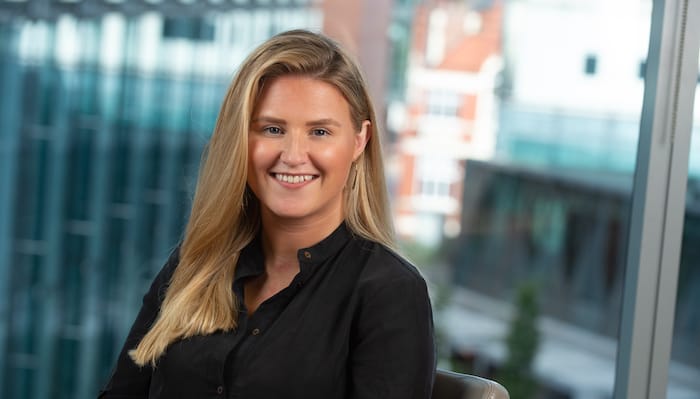DWF’s Ciara Healy shares her experience advising the firm on its 2019 listing

Just two years after qualifying as a solicitor, Ciara Healy, now a senior associate at DWF, was part of the in-house team that prepared the firm to be listed.
Most businesses are privately owned corporate entities with shareholders that have a say in how the business is run. Before the 2010 introduction of the Legal Services Act, all UK law firms were structured as Limited Liability Partnerships (LLPs). However, this Act made it possible for non-lawyers to own law firms and to be listed on the UK stock markets.
Listing is the process of opening up a business to public investment, and the two main places that businesses can get listed in the UK are the London Stock Exchange (LSE) and the Alternative Investment Market (AIM), which is a specialised sub-sector of the London Stock Exchange.
The first time a business is listed on any stock exchange and offers shares to the public is called an initial public offering (IPO). In March 2019, DWF made its IPO on the LSE at £366 million pounds. Having qualified with the firm two years before and advising on several IPOs in that time, Healy was asked to be involved in the firm’s listing. “From a cost and knowledge perspective it made sense for the firm to do certain parts of the listing itself,” she says. “I was seconded into the group legal team to assist for about six months with preparing the firm to be listed.” Whilst this is an unusual situation for a lawyer, there are nuances in this work that are best understood by those close to the business. “We learned about the firm in really granular detail”, she explains, ”you have to understand how the firm wants to sell itself, what its strategy for the future is and how it differentiates itself in the market.”
Whilst several law firms have become listed on the AIM, DWF is the first to be listed on the LSE. “Because of our size and the total value of our shares of stock, it made the most sense for us to be on the main market,” she explains.
“It was an amazing experience,“ she recalls. ”When the day to list finally came, we were invited down to the LSE to ring the bell signalling that the market is open and that DWF’s shares were being traded.”
During secondary school, Healy was a fan of English and history and was pointed towards law early by a careers adviser. She was offered a place to study law at Durham University and from thereon started planning a career as a solicitor. “After university, I went back home and started working for a small law firm around where I live”, she says, “it was mostly assistance for various bits and bobs and one day I decided to take a leap and do the LPC [Legal Practice Course].”
Healy makes an analogy between training contract (TC) applications and a driving test:
“You learn to pass the test and then you learn to drive, and I think TC applications are very much like that — there’s a set of skills for those types of applications and sometimes you need guidance as to how to fill them in.”
Following her LPC, Healy secured a TC with DWF in Manchester. In the year before the start of the contract, she took a job as a paralegal at the firm. “It helped my training contract exponentially,” she says. “By the time I started my TC I knew the systems and the people which was great.”
Corporate law can span quite a broad range of work. “It can be split into three main types”, Healy explains, “mergers and acquisitions, private equity, investments and equity capital markets.” Healy specialises in equity capital markets but all of these areas are connected to other areas of law and business. “Corporate is an interesting specialism because you learn a lot about different sectors and different types of businesses,” she confirms. “I feel more connected to how the general economy operates because I know lots about how different businesses are struggling or thriving in various areas.”
When it comes to what it takes to be a good corporate lawyer, Healy emphasises translating technical knowledge into practical skills. “Firstly, you have to be able to take the knowledge that you have and apply it in the context of the business and in relation to the business’ needs,” she says. “All three of those things take time”, she adds, “but if you can do it you’ll probably be a good corporate lawyer.”
And what one piece of advice would she give to students wanting to become corporate lawyers? “My advice is to make sure you love it,” she says. “Corporate law is an interesting beast that demands a lot of your time — if you don’t love it, it’s a hard specialism. If you do love it, take a leap of faith because it’s a great specialism to go into.”
Ciara Healy will be speaking at ‘What corporate lawyers do -– with DWF, Goodwin Procter, Squire Patton Boggs and BARBRI’, a virtual student event taking place on Wednesday 16 November. You can apply to attend the event, which is free, now.
About Legal Cheek Careers posts.


